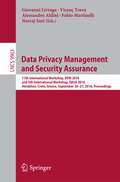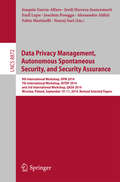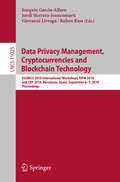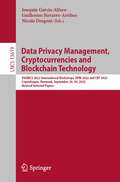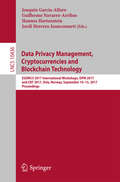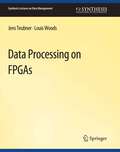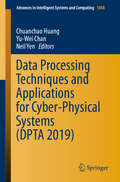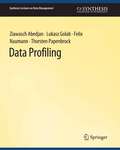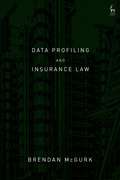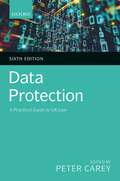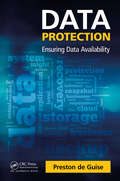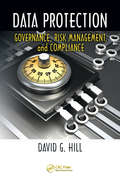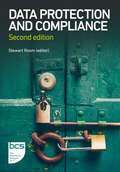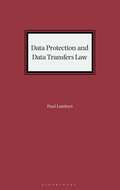- Table View
- List View
Data Privacy Management and Security Assurance: 11th International Workshop, DPM 2016 and 5th International Workshop, QASA 2016, Heraklion, Crete, Greece, September 26-27, 2016, Proceedings (Lecture Notes in Computer Science #9963)
by Giovanni Livraga Vicenç Torra Alessandro Aldini Fabio Martinelli Neeraj SuriThis book constitutes the refereed proceedings of the 11th International Workshop on Data Privacy Management, DPM 2016 and the 5th International Workshop on Quantitative Aspects in Security Assurance, QASA 2016, held in Heraklion, Crete, Greece, in September 2016. 9 full papers and 4 short papers out of 24 submissions are included in the DPM 2016 Workshop. They are organized around areas related to the management of privacy-sensitive informations, such as translation of high-level business goals into system-level privacy policies; administration of sensitive identifiers; data integration and privacy engineering. The QASA workshop centeres around research topics with a particular emphasis on the techniques for service oriented architectures, including aspects of dependability, privacy, risk and trust. Three full papers and one short papers out of 8 submissions are included in QASA 2016.
Data Privacy Management, Autonomous Spontaneous Security, and Security Assurance: 9th International Workshop, DPM 2014, 7th International Workshop, SETOP 2014, and 3rd International Workshop, QASA 2014, Wroclaw, Poland, September 10-11, 2014. Revised Selected Papers (Lecture Notes in Computer Science #8872)
by Joaquin Garcia-Alfaro Jordi Herrera-Joancomartí Emil Lupu Joachim Posegga Alessandro Aldini Fabio Martinelli Neeraj SuriThis book constitutes the revised selected papers of the 9th International Workshop on Data Privacy Management, DPM 2014, the 7th International Workshop on Autonomous and Spontaneous Security, SETOP 2014, and the 3rd International Workshop on Quantitative Aspects in Security Assurance, held in Wroclaw, Poland, in September 2014, co-located with the 19th European Symposium on Research in Computer Security (ESORICS 2014). The volume contains 7 full and 4 short papers plus 1 keynote talk from the DPM workshop; 2 full papers and 1 keynote talk from the SETOP workshop; and 7 full papers and 1 keynote talk from the QASA workshop - selected out of 52 submissions. The papers are organized in topical sections on data privacy management; autonomous and spontaneous security; and quantitative aspects in security assurance.
Data Privacy Management, Cryptocurrencies and Blockchain Technology: ESORICS 2018 International Workshops, DPM 2018 and CBT 2018, Barcelona, Spain, September 6-7, 2018, Proceedings (Lecture Notes in Computer Science #11025)
by Joaquin Garcia-Alfaro Jordi Herrera-Joancomartí Giovanni Livraga Ruben RiosThis book constitutes the refereed conference proceedings of the 2nd International Workshop on Cryprocurrencies and Blockchain Technology, CBT 2018, and the 13thInternational Workshop on Data Privacy Management, DPM 2018, on conjunction with the 23nd European Symposium on Research in Computer Security, ESORICS 2018, held in Barcelona, Spain, in September 2018. From the CBT Workshop 7 full and 8 short papers out of 39 submissions are included. The selected papers cover aspects of identity management, smart contracts, soft- and hardforks, proof-of-works and proof of stake as well as on network layer aspects and the application of blockchain technology for secure connect event ticketing. The DPM Workshop received 36 submissions from which 11 full and 5 short papers were selected for presentation. The papers focus on challenging problems such as translation of high-level buiness goals into system level privacy policies, administration of sensitive identifiers, data integration and privacy engineering.
Data Privacy Management, Cryptocurrencies and Blockchain Technology: ESORICS 2022 International Workshops, DPM 2022 and CBT 2022, Copenhagen, Denmark, September 26–30, 2022, Revised Selected Papers (Lecture Notes in Computer Science #13619)
by Joaquin Garcia-Alfaro Guillermo Navarro-Arribas Nicola DragoniThis book constitutes the refereed proceedings and revised selected papers from the ESORICS 2022 International Workshops on Data Privacy Management, Cryptocurrencies and Blockchain Technology, DPM 2022 and CBT 2022, which took place in Copenhagen, Denmark, during September 26–30, 2022.For DPM 2022, 10 full papers out of 21 submissions have been accepted for inclusion in this book. They were organized in topical sections as follows: differential privacy and data analysis; regulation, artificial intelligence, and formal verification; and leakage quantification and applications. The CBT 2022 workshop accepted 7 full papers and 3 short papers from 18 submissions. The papers were organized in the following topical sections: Bitcoin, lightning network and scalability; and anonymity, fault tolerance and governance; and short papers.
Data Privacy Management, Cryptocurrencies and Blockchain Technology: ESORICS 2017 International Workshops, DPM 2017 and CBT 2017, Oslo, Norway, September 14-15, 2017, Proceedings (Lecture Notes in Computer Science #10436)
by Joaquin Garcia-Alfaro Guillermo Navarro-Arribas Hannes Hartenstein Jordi Herrera-JoancomartíThis book constitutes the refereed conference proceedings of the 12th International Workshop on Data Privacy Management, DPM 2017, on conjunction with the 22nd European Symposium on Research in computer Security, ESORICS 2017 and the First International Workshop on Cryprocurrencies and Blockchain Technology (CBT 2017) held in Oslo, Norway, in September 2017.The DPM Workshop received 51 submissions from which 16 full papers were selected for presentation. The papers focus on challenging problems such as translation of high-level buiness goals into system level privacy policies, administration of sensitive identifiers, data integration and privacy engineering. From the CBT Workshop six full papers and four short papers out of 27 submissions are included. The selected papers cover aspects of identity management, smart contracts, soft- and hardforks, proof-of-works and proof of stake as well as on network layer aspects and the application of blockchain technology for secure connect event ticketing.
Data Privacy Management, Cryptocurrencies and Blockchain Technology: ESORICS 2020 International Workshops, DPM 2020 and CBT 2020, Guildford, UK, September 17–18, 2020, Revised Selected Papers (Lecture Notes in Computer Science #12484)
by Joaquin Garcia-Alfaro Guillermo Navarro-Arribas Jordi Herrera-JoancomartiThis book constitutes the revised selected post conference proceedings of the 15th International Workshop on Data Privacy Management, DPM 2020, and the 4th International Workshop on Cryptocurrencies and Blockchain Technology, CBT 2020, held in conjunction with the 25th European Symposium on Research in Computer Security, ESORICS 2020, held in Guildford, UK in September 2020.For the CBT Workshop 8 full and 4 short papers were accepted out of 24 submissions. The selected papers are organized in the following topical headings: Transactions, Mining, Second Layer and Inter-bank Payments. The DPM Workshop received 38 submissions from which 12 full and 5 short papers were selected for presentation. The papers focus on Second Layer, Signature Schemes, Formal Methods, Privacy, SNARKs and Anonymity.
Data Privacy Management, Cryptocurrencies and Blockchain Technology: ESORICS 2021 International Workshops, DPM 2021 and CBT 2021, Darmstadt, Germany, October 8, 2021, Revised Selected Papers (Lecture Notes in Computer Science #13140)
by Joaquin Garcia-Alfaro Guillermo Navarro-Arribas Miguel Soriano Jose Luis Muñoz-TapiaThis book constitutes the refereed proceedings and revised selected papers from the 16th International Workshop on Data Privacy Management, DPM 2021, and the 5th International Workshop on Cryptocurrencies and Blockchain Technology, CBT 2021, which were held online on October 8, 2021, in conjunction with ESORICS 2021. The workshops were initially planned to take place in Darmstadt, Germany, and changed to an online event due to the COVID-19 pandemic.The DPM 2021 workshop received 25 submissions and accepted 7 full and 3 short papers for publication. These papers were organized in topical sections as follows: Risks and privacy preservation; policies and regulation; privacy and learning. For CBT 2021 6 full papers and 6 short papers were accepted out of 31 submissions. They were organized in topical sections as follows: Mining, consensus and market manipulation; smart contracts and anonymity.
Data Privacy Management, Cryptocurrencies and Blockchain Technology: ESORICS 2019 International Workshops, DPM 2019 and CBT 2019, Luxembourg, September 26–27, 2019, Proceedings (Lecture Notes in Computer Science #11737)
by Cristina Pérez-Solà Guillermo Navarro-Arribas Alex Biryukov Joaquin Garcia-AlfaroThis book constitutes the refereed conference proceedings of the 14th International Workshop on Data Privacy Management, DPM 2019, and the Third International Workshop on Cryptocurrencies and Blockchain Technology, CBT 2019, held in conjunction with the 24th European Symposium on Research in Computer Security, ESORICS 2019, held in Luxembourg in September 2019. For the CBT Workshop 10 full and 8 short papers were accepted out of 39 submissions. The selected papers are organized in the following topical headings: lightning networks and level 2; smart contracts and applications; and payment systems, privacy and mining. The DPM Workshop received 26 submissions from which 8 full and 2 short papers were selected for presentation. The papers focus on privacy preserving data analysis; field/lab studies; and privacy by design and data anonymization.Chapter 2, “Integral Privacy Compliant Statistics Computation,” and Chapter 8, “Graph Perturbation as Noise Graph Addition: a New Perspective for Graph Anonymization,” of this book are available open access under a CC BY 4.0 license at link.springer.com.
Data Processing on FPGAs (Synthesis Lectures on Data Management)
by Jens Teubner Louis WoodsRoughly a decade ago, power consumption and heat dissipation concerns forced the semiconductor industry to radically change its course, shifting from sequential to parallel computing. Unfortunately, improving performance of applications has now become much more difficult than in the good old days of frequency scaling. This is also affecting databases and data processing applications in general, and has led to the popularity of so-called data appliances—specialized data processing engines, where software and hardware are sold together in a closed box. Field-programmable gate arrays (FPGAs) increasingly play an important role in such systems. FPGAs are attractive because the performance gains of specialized hardware can be significant, while power consumption is much less than that of commodity processors. On the other hand, FPGAs are way more flexible than hard-wired circuits (ASICs) and can be integrated into complex systems in many different ways, e.g., directly in the network for a high-frequency trading application. This book gives an introduction to FPGA technology targeted at a database audience. In the first few chapters, we explain in detail the inner workings of FPGAs. Then we discuss techniques and design patterns that help mapping algorithms to FPGA hardware so that the inherent parallelism of these devices can be leveraged in an optimal way. Finally, the book will illustrate a number of concrete examples that exploit different advantages of FPGAs for data processing. Table of Contents: Preface / Introduction / A Primer in Hardware Design / FPGAs / FPGA Programming Models / Data Stream Processing / Accelerated DB Operators / Secure Data Processing / Conclusions / Bibliography / Authors' Biographies / Index
Data Processing Techniques and Applications for Cyber-Physical Systems (Advances in Intelligent Systems and Computing #1088)
by Neil Yen Chuanchao Huang Yu-Wei ChanThis book covers cutting-edge and advanced research on data processing techniques and applications for Cyber-Physical Systems. Gathering the proceedings of the International Conference on Data Processing Techniques and Applications for Cyber-Physical Systems (DPTA 2019), held in Shanghai, China on November 15–16, 2019, it examines a wide range of topics, including: distributed processing for sensor data in CPS networks; approximate reasoning and pattern recognition for CPS networks; data platforms for efficient integration with CPS networks; and data security and privacy in CPS networks. Outlining promising future research directions, the book offers a valuable resource for students, researchers and professionals alike, while also providing a useful reference guide for newcomers to the field.
Data Professionals at Work
by Malathi MahadevanEnjoy reading interviews with more than two dozen data professionals to see a picture of what it’s like to work in the industry managing and analyzing data, helping you to know what it takes to move from your current expertise into one of the fastest growing areas of technology today. Data is the hottest word of the century, and data professionals are in high demand. You may already be a data professional such as a database administrator or business intelligence analyst. Or you may be one of the many people who want to work as a data professional, and are curious how to get there. Either way, this collection helps you understand how data professionals work, what makes them successful, and what they do to keep up.You’ll find interviews in this book with database administrators, database programmers, data architects, business intelligence professionals, and analytics professionals. Interviewees work across industry sectors ranging from healthcare and banking to finance and transportation and beyond. Each chapter illuminates a successful professional at the top of their game, who shares what helped them get to the top, and what skills and attitudes combine to make them successful in their respective fields.Interviewees in the book include: Mindy Curnutt, Julie Smith, Kenneth Fisher, Andy Leonard, Jes Borland, Kevin Feasel, Ginger Grant, Vicky Harp, Kendra Little, Jason Brimhall, Tim Costello, Andy Mallon, Steph Locke, Jonathan Stewart, Joseph Sack, John Q. Martin, John Morehouse, Kathi Kellenberger, Argenis Fernandez, Kirsten Benzel, Tracy Boggiano, Dave Walden, Matt Gordon, Jimmy May, Drew Furgiuele, Marlon Ribunal, and Joseph Fleming. All of them have been successful in their careers, and share their perspectives on working and succeeding in the field as data and database professionals. What You'll LearnStand out as an outstanding professional in your area of data work by developing the right set of skills and attitudes that lead to successAvoid common mistakes and pitfalls, and recover from operational failures and bad technology decisionsUnderstand current trends and best practices, and stay out in front as the field evolvesBreak into working with data through database administration, business intelligence, or any of the other career paths represented in this bookManage stress and develop a healthy work-life balance no matter which career path you decide uponChoose a suitable path for yourself from among the different career paths in working with dataWho This Book Is ForDatabase administrators and developers, database and business intelligence architects, consultants, and analytic professionals, as well as those intent on moving into one of those career paths. Aspiring data professionals and those in related technical fields who want to make a move toward managing or analyzing data on a full-time basis will find the book useful. Existing data professionals who want to be outstanding and successful at what they do will also appreciate the book's advice and guidance.
Data Profiling (Synthesis Lectures on Data Management)
by Ziawasch Abedjan Lukasz Golab Felix Naumann Thorsten PapenbrockData profiling refers to the activity of collecting data about data, {i.e.}, metadata. Most IT professionals and researchers who work with data have engaged in data profiling, at least informally, to understand and explore an unfamiliar dataset or to determine whether a new dataset is appropriate for a particular task at hand. Data profiling results are also important in a variety of other situations, including query optimization, data integration, and data cleaning. Simple metadata are statistics, such as the number of rows and columns, schema and datatype information, the number of distinct values, statistical value distributions, and the number of null or empty values in each column. More complex types of metadata are statements about multiple columns and their correlation, such as candidate keys, functional dependencies, and other types of dependencies. This book provides a classification of the various types of profilable metadata, discusses popular data profiling tasks, and surveys state-of-the-art profiling algorithms. While most of the book focuses on tasks and algorithms for relational data profiling, we also briefly discuss systems and techniques for profiling non-relational data such as graphs and text. We conclude with a discussion of data profiling challenges and directions for future work in this area.
Data Profiling and Insurance Law
by Brendan McGurkThis timely, expertly written monograph looks at the legal impact that the use of 'Big Data' will have on the provision – and substantive law – of insurance. Insurance companies are set to become some of the biggest consumers of big data which will enable them to profile prospective individual insureds at an increasingly granular level. More particularly, the book explores how: (i) insurers gain access to information relevant to assessing risk and/or the pricing of premiums; (ii) the impact which that increased information will have on substantive insurance law (and in particular duties of good faith disclosure and fair presentation of risk); and (iii) the impact that insurers' new knowledge may have on individual and group access to insurance.This raises several consequential legal questions: (i) To what extent is the use of big data analytics to profile risk compatible (at least in the EU) with the General Data Protection Regulation? (ii) Does insurers' ability to parse vast quantities of individual data about insureds invert the information asymmetry that has historically existed between insured and insurer such as to breathe life into insurers' duty of good faith disclosure? And (iii) by what means might legal challenges be brought against insurers both in relation to the use of big data and the consequences it may have on access to cover?Written by a leading expert in the field, this book will both stimulate further debate and operate as a reference text for academics and practitioners who are faced with emerging legal problems arising from the increasing opportunities that big data offers to the insurance industry.
Data Profiling and Insurance Law
by Brendan McGurkThis timely, expertly written monograph looks at the legal impact that the use of 'Big Data' will have on the provision – and substantive law – of insurance. Insurance companies are set to become some of the biggest consumers of big data which will enable them to profile prospective individual insureds at an increasingly granular level. More particularly, the book explores how: (i) insurers gain access to information relevant to assessing risk and/or the pricing of premiums; (ii) the impact which that increased information will have on substantive insurance law (and in particular duties of good faith disclosure and fair presentation of risk); and (iii) the impact that insurers' new knowledge may have on individual and group access to insurance.This raises several consequential legal questions: (i) To what extent is the use of big data analytics to profile risk compatible (at least in the EU) with the General Data Protection Regulation? (ii) Does insurers' ability to parse vast quantities of individual data about insureds invert the information asymmetry that has historically existed between insured and insurer such as to breathe life into insurers' duty of good faith disclosure? And (iii) by what means might legal challenges be brought against insurers both in relation to the use of big data and the consequences it may have on access to cover?Written by a leading expert in the field, this book will both stimulate further debate and operate as a reference text for academics and practitioners who are faced with emerging legal problems arising from the increasing opportunities that big data offers to the insurance industry.
Data Protection: A Practical Guide to UK Law
by Peter CareyNow in its sixth edition, this invaluable handbook provides a complete guide to the practical application of data protection law in the UK. It is fully updated and expanded to include coverage of significant developments in the practice of data protection, and takes account of new legislation since the last edition. The sixth edition includes coverage of the Data Protection Act 2018, Data Protection, Privacy and Electronic Communications (Amendments etc.) (EU Exit) Regulations 2019, and the European Union (Withdrawal Agreement) Act 2020, and contains relevant analysis of the effect of Brexit on UK data protection law. Data Protection: A Practical Guide to UK Law is essential reading for all those working with data protection issues, including in compliance departments in both the public and private sectors, as well as in-house and private practice lawyers, company secretaries, HR Officers, marketing executives and IT specialists.
Data Protection: A Practical Guide to UK Law
by Peter CareyNow in its sixth edition, this invaluable handbook provides a complete guide to the practical application of data protection law in the UK. It is fully updated and expanded to include coverage of significant developments in the practice of data protection, and takes account of new legislation since the last edition. The sixth edition includes coverage of the Data Protection Act 2018, Data Protection, Privacy and Electronic Communications (Amendments etc.) (EU Exit) Regulations 2019, and the European Union (Withdrawal Agreement) Act 2020, and contains relevant analysis of the effect of Brexit on UK data protection law. Data Protection: A Practical Guide to UK Law is essential reading for all those working with data protection issues, including in compliance departments in both the public and private sectors, as well as in-house and private practice lawyers, company secretaries, HR Officers, marketing executives and IT specialists.
Data Protection: Ensuring Data Availability
by Preston de GuiseThis is the fundamental truth about data protection: backup is dead. Or rather, backup and recovery, as a standalone topic, no longer has relevance in IT. As a standalone topic, it’s been killed off by seemingly exponential growth in storage and data, by the cloud, and by virtualization. So what is data protection? This book takes a holistic, business-based approach to data protection. It explains how data protection is a mix of proactive and reactive planning, technology and activities that allow for data continuity. It shows how truly effective data protection comes from a holistic approach considering the entire data lifecycle and all required SLAs. Data protection is neither RAID nor is it continuous availability, replication, snapshots or backups—it is all of them, combined in a considered and measured approach to suit the criticality of the data and meet all the requirements of the business. The book also discusses how businesses seeking to creatively leverage their IT investments and to drive through cost optimization are increasingly looking at data protection as a mechanism to achieve those goals. In addition to being a type of insurance policy, data protection is becoming an enabler for new processes around data movement and data processing. This book arms readers with information critical for making decisions on how data can be protected against loss in the cloud, on-premises, or in a mix of the two. It explains the changing face of recovery in a highly virtualized data center and techniques for dealing with big data. Moreover, it presents a model for where data recovery processes can be integrated with IT governance and management in order to achieve the right focus on recoverability across the business.
Data Protection: Ensuring Data Availability
by Preston de GuiseThis is the fundamental truth about data protection: backup is dead. Or rather, backup and recovery, as a standalone topic, no longer has relevance in IT. As a standalone topic, it’s been killed off by seemingly exponential growth in storage and data, by the cloud, and by virtualization. So what is data protection? This book takes a holistic, business-based approach to data protection. It explains how data protection is a mix of proactive and reactive planning, technology and activities that allow for data continuity. It shows how truly effective data protection comes from a holistic approach considering the entire data lifecycle and all required SLAs. Data protection is neither RAID nor is it continuous availability, replication, snapshots or backups—it is all of them, combined in a considered and measured approach to suit the criticality of the data and meet all the requirements of the business. The book also discusses how businesses seeking to creatively leverage their IT investments and to drive through cost optimization are increasingly looking at data protection as a mechanism to achieve those goals. In addition to being a type of insurance policy, data protection is becoming an enabler for new processes around data movement and data processing. This book arms readers with information critical for making decisions on how data can be protected against loss in the cloud, on-premises, or in a mix of the two. It explains the changing face of recovery in a highly virtualized data center and techniques for dealing with big data. Moreover, it presents a model for where data recovery processes can be integrated with IT governance and management in order to achieve the right focus on recoverability across the business.
Data Protection: Ensuring Data Availability
by Preston de GuiseThe second edition of Data Protection goes beyond the traditional topics including deduplication, continuous availability, snapshots, replication, backup and recovery, and explores such additional considerations as legal, privacy, and ethical issues. A new model is presented for understanding and planning the various aspects of data protection, which is essential to developing holistic strategies. The second edition also addresses the Cloud and the growing adoption of software and function as a service, as well as effectively planning over the lifespan of a workload what the best mix of traditional, and cloud native data protection services might be. Virtualization continues to present new challenges to data protection, and the impact of containerization is examined. The book takes a holistic, business-based approach to data protection. It explains how data protection is a mix of proactive and reactive planning, technology and activities that allow for data continuity. There are three essential activities that refer to themselves as data protection; while they all overlap in terms of scope and function, each operate as reasonably self-contained fields with their own specialists and domain nomenclature. These three activities are: Data protection as a storage and recovery activity Data protection as a security activity Data protection as a privacy activity These activities are covered in detail, with a focus on how organizations can use them to leverage their IT investments and optimize costs. The book also explains how data protection is becoming an enabler for new processes around data movement and data processing. This book arms readers with information critical for making decisions on how data can be protected against loss in the cloud, on-premises, or in a mix of the two. It explains the changing face of recovery in a highly virtualized data center and techniques for dealing with big data. Moreover, it presents a model for where data recovery processes can be integrated with IT governance and management in order to achieve the right focus on recoverability across the business.
Data Protection: Ensuring Data Availability
by Preston de GuiseThe second edition of Data Protection goes beyond the traditional topics including deduplication, continuous availability, snapshots, replication, backup and recovery, and explores such additional considerations as legal, privacy, and ethical issues. A new model is presented for understanding and planning the various aspects of data protection, which is essential to developing holistic strategies. The second edition also addresses the Cloud and the growing adoption of software and function as a service, as well as effectively planning over the lifespan of a workload what the best mix of traditional, and cloud native data protection services might be. Virtualization continues to present new challenges to data protection, and the impact of containerization is examined. The book takes a holistic, business-based approach to data protection. It explains how data protection is a mix of proactive and reactive planning, technology and activities that allow for data continuity. There are three essential activities that refer to themselves as data protection; while they all overlap in terms of scope and function, each operate as reasonably self-contained fields with their own specialists and domain nomenclature. These three activities are: Data protection as a storage and recovery activity Data protection as a security activity Data protection as a privacy activity These activities are covered in detail, with a focus on how organizations can use them to leverage their IT investments and optimize costs. The book also explains how data protection is becoming an enabler for new processes around data movement and data processing. This book arms readers with information critical for making decisions on how data can be protected against loss in the cloud, on-premises, or in a mix of the two. It explains the changing face of recovery in a highly virtualized data center and techniques for dealing with big data. Moreover, it presents a model for where data recovery processes can be integrated with IT governance and management in order to achieve the right focus on recoverability across the business.
Data Protection: Governance, Risk Management, and Compliance
by David G. HillFailure to appreciate the full dimensions of data protection can lead to poor data protection management, costly resource allocation issues, and exposure to unnecessary risks. Data Protection: Governance, Risk Management, and Compliance explains how to gain a handle on the vital aspects of data protection.The author begins by building the foundatio
Data Protection and Compliance: Second edition (G - Reference,information And Interdisciplinary Subjects Ser.)
by Ben Johnson Richard Hall Jamie Taylor Simon Davis Niall O'Brien Stewart Room Michelle Maher Adam Panagiotopoulos Shervin Nahid Tughan Thuraisingam James Drury-Smith Mark HendryLarge-scale data loss and data privacy compliance breaches continue to make headline news, highlighting the need for stringent data protection policies, especially when personal or commercially sensitive information is at stake. While regulations and legislation exist to address these issues, how organisations can best tailor their compliance approaches to their own operational circumstances has remained an open question. The focus of this book is on operationalising a truly risk-based approach to data protection and compliance, beyond just emphasis on regulatory frameworks and legalistic compliance.
Data Protection and Compliance: Second edition
by Stewart Room Michelle Maher Niall O'Brien Adam Panagiotopoulos Shervin Nahid Richard Hall Tughan Thuraisingam James Drury-Smith Simon Davis Mark Hendry Jamie Taylor Ben JohnsonLarge-scale data loss and data privacy compliance breaches continue to make headline news, highlighting the need for stringent data protection policies, especially when personal or commercially sensitive information is at stake. While regulations and legislation exist to address these issues, how organisations can best tailor their compliance approaches to their own operational circumstances has remained an open question. The focus of this book is on operationalising a truly risk-based approach to data protection and compliance, beyond just emphasis on regulatory frameworks and legalistic compliance.
Data Protection and Data Transfers Law
by Paul LambertThis title brings together the different aspects of the transfer landscape and outlines the separate rules, all in one accessible place. Data transfers (under data protection rules) are one of the most discussed areas of data protection, and are currently undergoing significant change. Data transfers are relied on as an essential function of national and international trade, business, and internet use. It is essential for practitioners to keep abreast of the new data transfer rules and changes for their clients. Following on from Brexit, professionals now have more than one set of transfer rules to comply with, including:- The different data transfer channels- New Adequacy Decision- New Standard Contract rules- New UK Contract rules- Consultation process on future laws- New proposed UK data laws- Data law and data transfer changes- Practical and commercial considerationsThere are more UK data transfer channels and rules to consider now than at any time previously. The UK data transfer regime is now more complex than the EU data transfer regime, necessitating significant extra diligence by commercial entities. This book is designed to assist UK and international law professionals, in-house data protection professionals and a wide range of other interested readers on the increasingly complex area of data rules.
Data Protection and Digital Sovereignty Post-Brexit
by Edoardo Celeste, Róisín Á Costello, Edina Harbinja and Napoleon XanthoulisOne of the promises of Brexit was to allow the UK to regain its legislative sovereignty from the EU. However, after Brexit, UK data protection law must remain in line with EU standards in order not to lose the adequacy status that allows personal data to be transferred from the EU. This circumstance generates tensions between the EU, which is committed to preserving its digital sovereignty by ensuring an adequate protection of personal data even beyond its borders, and the UK's ambition to become a champion of the digital economy by adopting an innovative and pro-business legislation in the digital field. The book analyses the latest legal and policy developments in this context, focusing on data protection but also exploring its intersection with other related regulatory areas, such as artificial intelligence and online safety. Renowned international experts contextualise current regulatory trends and policy proposals to understand whether a new UK model in the field of digital regulation is emerging and to what extent this will exacerbate existing tensions between the UK and the EU. The book includes an accessible and detailed analysis of the major judicial decisions, laws, and current bills offering an invaluable guide to academics, practitioners, and policymakers navigating the complex issues of cross-border data protection post-Brexit.
